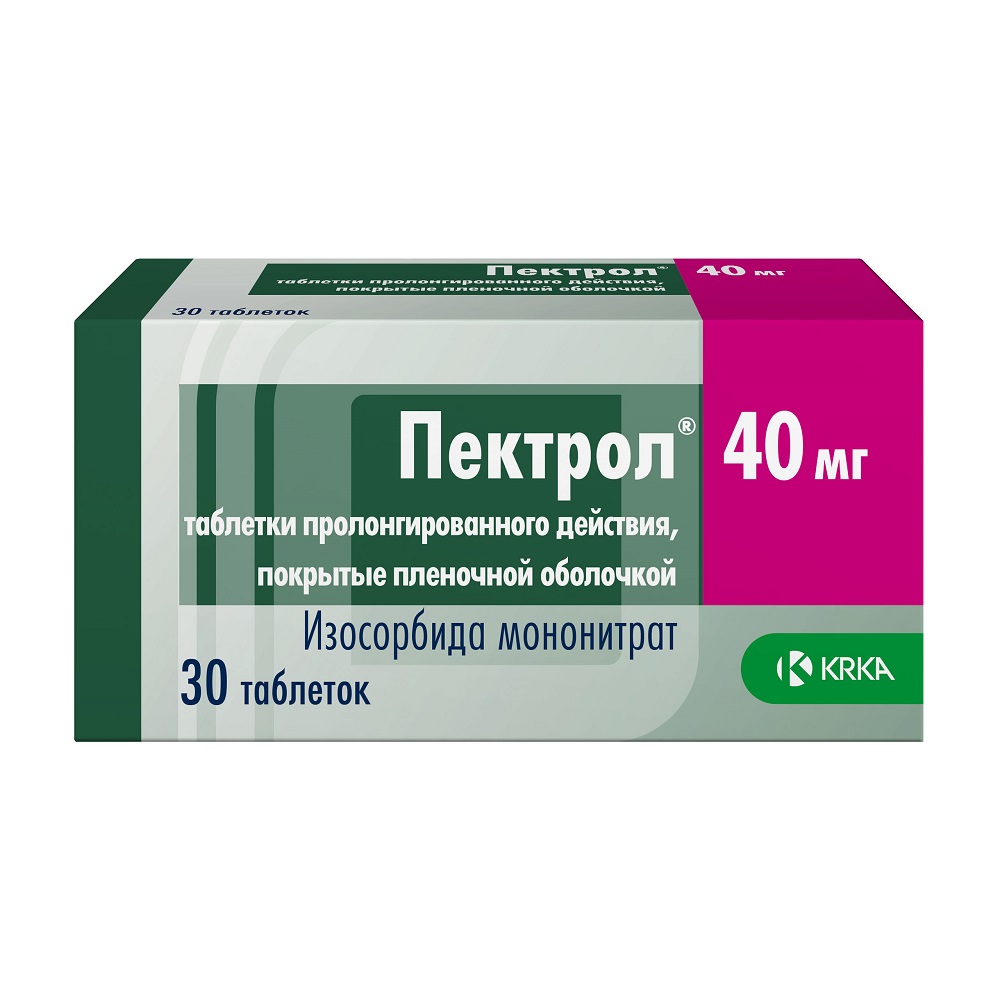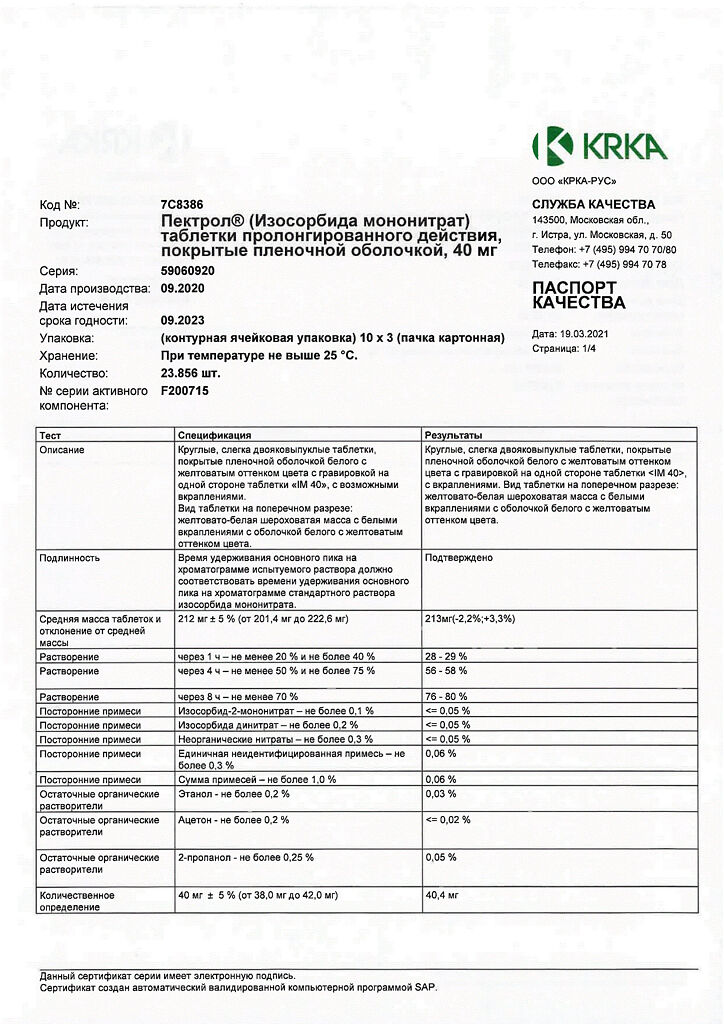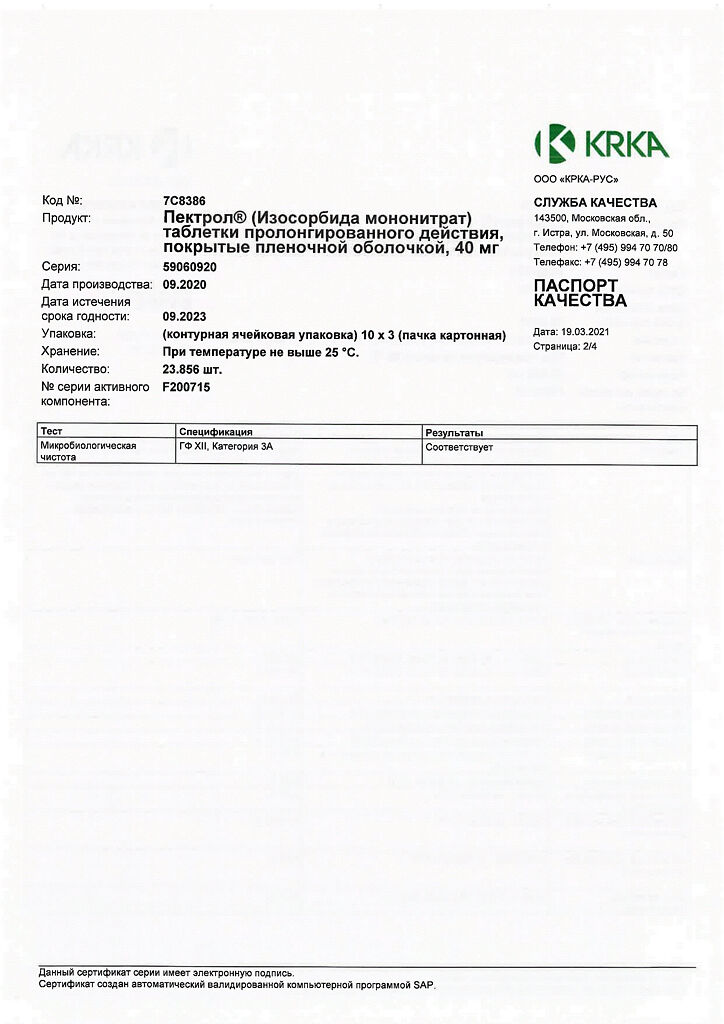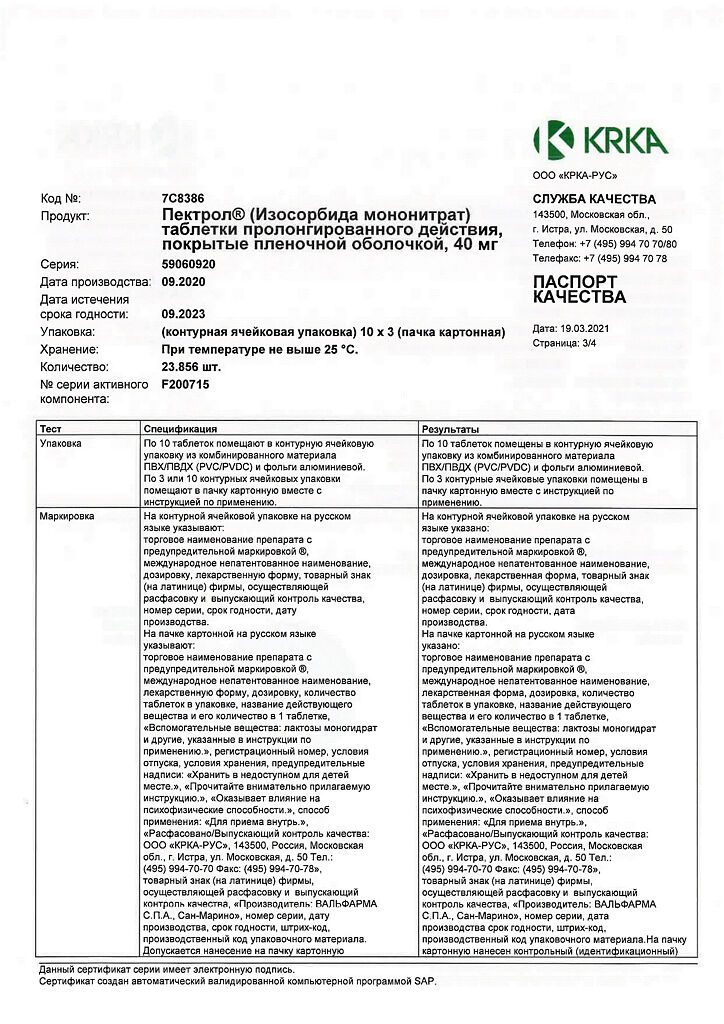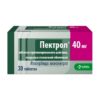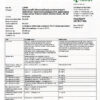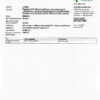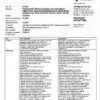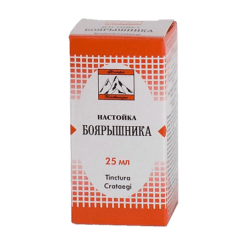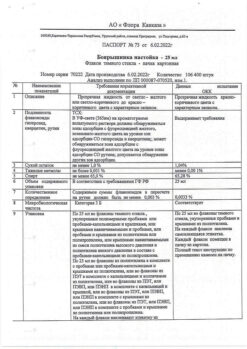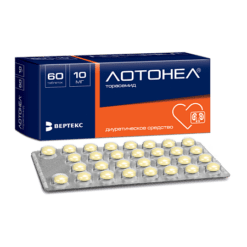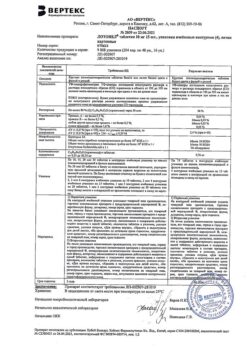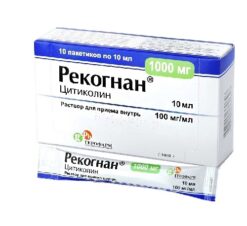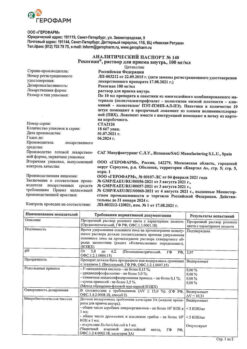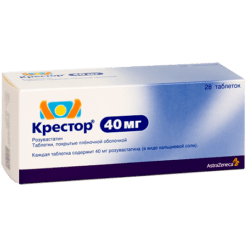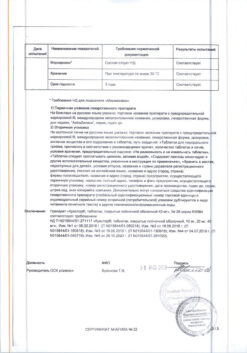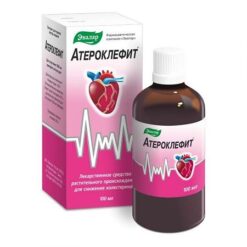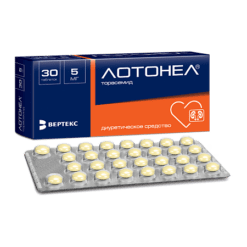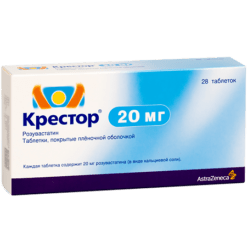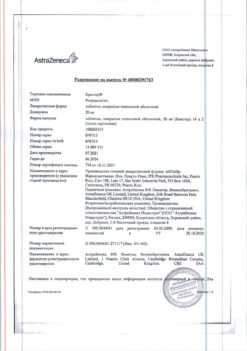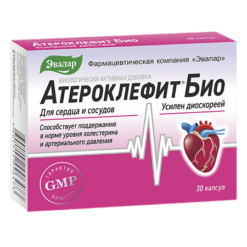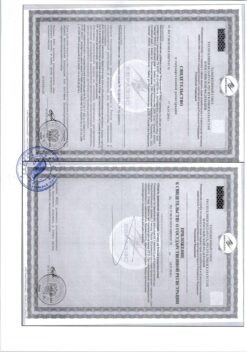No products in the cart.
Pectrol, 40 mg 30 pcs.
€6.17 €5.00
Description
Peripheral vasodilator with predominant effect on venous vessels.
Pectrol stimulates formation of nitric oxide (endothelial relaxing factor) in vascular endothelium causing activation of intracellular guanylate cyclase, which results in increase of cGMP (mediator of vasodilation). Vasodilation decreases venous return to the heart (preload), reducing the load on the heart, which reduces myocardial oxygen demand. The dilating effect of nitrates on arteries and arterioles reduces PPS (post-load).
Pectrol has coronary dilator effect. It reduces the blood flow to the right atrium, helps to reduce the pressure in the small circle of circulation and regresses the symptoms of pulmonary edema. Promotes redistribution of coronary blood flow in the area with reduced blood supply.
Pectrol increases exercise tolerance in patients with IHD, angina pectoris. Dilates the vessels of the brain, dura mater, which may be accompanied by headache. Inhibits platelet aggregation, reduces intraplatelet synthesis of thromboxane.
Like other nitrates, cross-tolerance develops. After withdrawal (interruption of treatment), sensitivity is quickly restored.
The antianginal effect occurs 30-40 min after oral administration and lasts up to 8-10 h.
Pharmacokinetics
After oral administration isosorbide mononitrate is quickly and completely adsorbed from the gastrointestinal tract (GIT). It has absolute bioavailability – about 100%, since there is no “first pass” effect through the liver. Isosorbide mononitrate release from tablets does not depend on food intake, peristalsis or pH in intestinal lumen.
Isosorbide mononitrate is distributed in total body fluid, and only 5% is bound to plasma proteins. Therapeutic concentration of 100 ng/ml is reached 30 minutes after oral administration.
Isosorbide mononitrate is metabolized by denitrification and conjugation with glucuronic acid. The inactive metabolite is excreted through the kidneys. Renal clearance is 115 ml/min. The elimination half-life is 4 to 10 hours. In hepatic and renal insufficiency pharmacokinetics of isosorbide mononitrate does not change significantly.
Indications
Indications
Prevention of angina attacks in patients with coronary heart disease;
Cronic heart failure (as part of combination therapy).
Active ingredient
Active ingredient
Composition
Composition
Active ingredient:
Isosorbide-5-monononitrate 40.0 mg.
Auxiliary Substances:
Hypromellose;
Carnauba wax;
p> Purified stearic acid;
Lactose monohydrate;
Magnesium stearate;
Purified silicon dioxide;
Talc;
Titanium dioxide;
Macrogol 4000;
Red iron oxide dye.
How to take, the dosage
How to take, the dosage
The tablets should be taken orally, after meals, swallowed whole and washed down with a glass of water.
The usual starting dose is 1 tablet 40 mg per day, in the morning.
If necessary, the dose can be increased to 60 mg per day.
In case of nocturnal attacks of angina, the tablet should be taken in the evening.
The dose of the drug can be increased to 60 m g once daily or to 2 tablets of 40 mg 2 times daily in 2 doses. The dose of the drug and the frequency of administration are set individually, depending on the severity of the disease. Depending on the severity of the clinical effect from 3-5 days of therapy the single dose can be increased to 40-60 mg (in special cases up to 80 mg/day) with the same number of doses.
The treatment of chronic heart failure is usually started in a hospital, where the dose is adjusted until an appropriate maintenance dose is determined. The appropriate dose of the drug should be determined with consideration of clinical effects and side effects.
For both indications, patients should take 1 tablet of 40 mg or 60 mg once daily or a tablet of 40 mg twice daily (1 tablet in the morning and a second approximately 7 hours later). There should be at least 12 hours between the last dose in the evening and the first dose the next morning.
Interaction
Interaction
Pectrol® when used concomitantly increases the plasma concentration of dihydroergotamine.
Barbiturates accelerate biotransformation and decrease the blood concentration of isosorbide mononitrate.
When co-administered with antihypertensive agents, vasodilators, antipsychotics (neuroleptics), tricyclic antidepressants, novokainamide, ethanol, quinidine, beta-adrenoblockers, slow calcium channel blockers, dihydroergotamine and sildenafil
Special Instructions
Special Instructions
Pectrol is not intended to stop an angina attack.
The correct use of isosorbide mononitrate ensures a period of low nitrate concentration, which is necessary to prevent the development of nitrate tolerance. As with all nitrates, it is important to strictly follow the dosing instructions for Pectrol and observe a 12-hour interval between doses. In this case, a period of low concentration (less than 100 ng/L) is achieved while maintaining the therapeutic effect.
An abrupt withdrawal of the drug should be avoided and the dose should be reduced gradually.
The BP and heart rate must be monitored during therapy.
When transferring patients taking isosorbide dinitrate to isosorbide mononitrate, the total daily dose should be calculated in advance. It is known that 10 mg of mononitrate corresponds to 20 mg of isosorbide dinitrate.
The effect on the ability to drive and operate machinery:
The ability to quick mental and motor reactions may be reduced, so caution should be exercised in driving vehicles and engaging in potentially hazardous activities during therapy with the drug.
Contraindications
Contraindications
Hypersensitivity to nitrates or other components of the drug.
Arterial hypotension and hypovolemia (systolic blood pressure below 100 mm Hg, diastolic blood pressure below 60 mm Hg, central venous pressure below 4-5 mmHg.);
Acute heart failure;
Side effects
Side effects
Cardiovascular system disorders:”nitrate” headache, dizziness, transient facial hyperemia, fever, tachycardia, marked decrease of blood pressure (BP). In rare cases – worsening of angina attacks (paradoxical reaction), orthostatic collapse.
Gastrointestinal disorders: nausea, vomiting, possible sensation of slight burning of the tongue, dry mouth;
Central nervous system disorders: stiffness, somnolence, blurred vision, decreased capacity for rapid mental and motor reactions (especially at the beginning of treatment). In rare cases – cerebral ischemia.
Allergic reactions: skin rash, in some cases – exfoliative dermatitis.
Others:development of tolerance (including cross-tolerance to other nitrates).
Overdose
Overdose
Symptoms: Headache, dizziness, palpitations, hyperthermia, skin hyperemia, sweating, nausea, vomiting, diarrhea, methemoglobinemia (cyanosis, anoxia), hyperpnea, dyspnea, bradycardia, seizures, visual disturbances, increased intracranial pressure, collapse, syncope, paralysis, coma.
Treatment: gastric lavage, in case of methemoglobinemia – oral or intravenous ascorbic acid – 1 g intravenous 1% methylene blue solution 1-2 mg/kg. Symptomatic therapy in severe arterial hypotension – IV phenylephrine (mesaton), (epinephrine and related compounds are ineffective).
Pregnancy use
Pregnancy use
The use of isosorbide mononitrate is possible only when the expected benefit to the mother exceeds the potential risk to the fetus and/or child.
Similarities
Similarities
Additional information
| Shelf life | 3 years. |
|---|---|
| Conditions of storage | At a temperature not exceeding 25 °C. |
| Manufacturer | KRKA dd Novo mesto, Slovenia |
| Medication form | sustained release tablets |
| Brand | KRKA dd Novo mesto |
Related products
Buy Pectrol, 40 mg 30 pcs. with delivery to USA, UK, Europe and over 120 other countries.

